Last Updated on March 27, 2023
The prepositions of time in German, like the prepositions of place discussed in the previous part, are that mandatory base without which it is difficult to start speaking.
Basic German with tables. 3. Local prepositions
Conjunctions in sentences. Different word order
Basic German with tables. 2. Noun and articles
Betrag or Beitrag, vertragen or ertragen and other members of tragen family
German picture description phrases and sequence
How to ask the time in German
You can ask the time in German using the pronoun es. The preposition “at” corresponds to the preposition um
What time is it?
Wie spät ist es?
Wie viel Uhr ist es?
What time… (will you come, will you close…)
Um wie viel Uhr kommst du? – Ich komme um drei Uhr
Um wie viel Uhr schließen Sie? – Um 20 Uhr schließen wir heute
How much time do you need?
Wie viel Zeit brauchen Sie?
Time is indicated so
Es ist fünf Uhr.
15 hours 15 (minutes) –
Es ist fünfzehn Uhr fünfzehn
15 minutes past three
Es ist fünfzehn nach drei
quarter to four
Es ist Viertel vor vier
half past three
Es ist halb vier
Um halb vier muss ich zu Hause sein

Prepositions of time in German: a point in time
Hours
Hours go, as a rule, with a preposition um.
The approximate time is indicated by the words zirca (usually in writing in the form of an abbreviation сa.) or gegen
Ich komme um ca. 20 Uhr
Ich bin zu Hause gegen 16 Uhr.
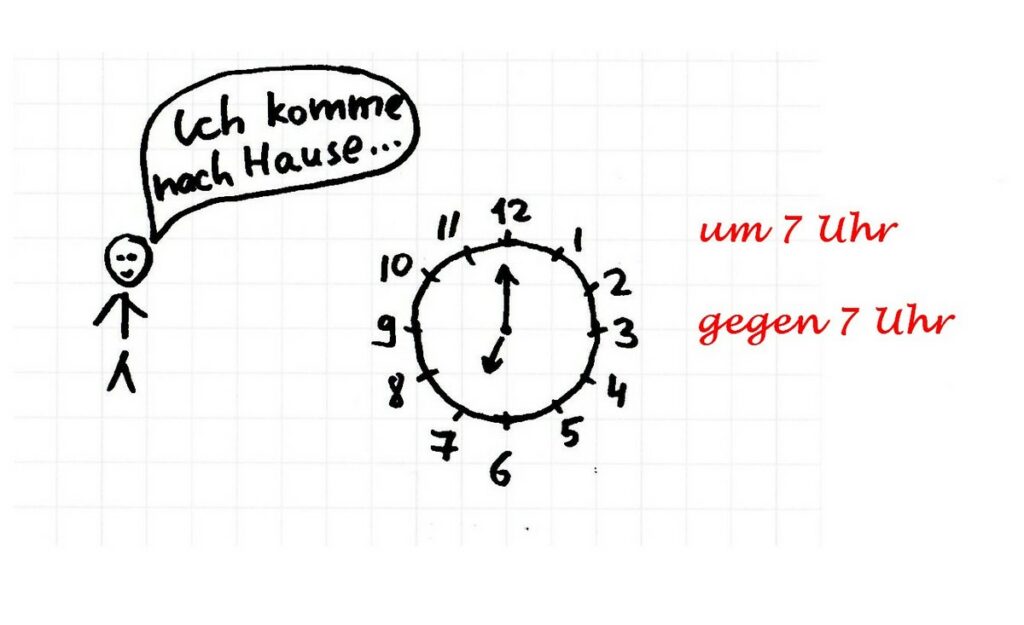
To say 8 o’clock in the morning or 8 o’clock in the evening, use the words
am Abend, am Morgen
or (more often) adverbs
morgens, abends, nachts, mittags
Um 8 Uhr morgens
The phrase meaning “tomorrow morning” often causes confusion, since Morgen means both morning as a noun and tomorrow as an adverb:
[shariff]Ich gehe zum Arzt morgen früh.
Time of day, days of the week and dates
To indicate the time of day, day of the week, or date, use the preposition am (an + dem). Since almost all words are masculine, you can skip the article and say am.
Why am? Read the topic about preposition of place
am Abend, am Morgen
am Montag, am Mittwoch
am 21. Juli
An exception is the word die Nacht (f), respectively:
in der Nacht (Dat)
um Mitternacht (Akk)
As well as holidays that are used without an article, so it will be an or zu (equally, different regions prefer one or the other)
zu / an Weihnachten
an / zu Ostern
Months, week (whole), seasons, years
jeden Tag – everyday (Sommer, Montag, Januar…. – every summer, monday, January…)
jede Woche – every week
jedes Jahr – every year
diese Woche – this week
letzte Woche – last week
Anfang (Mitte, Ende) des Monats, der Woche – beginning (middle, end) of the month, week
Ende Januar – end (middle, beginning…) of January (February…)
The main preposition for days, weeks and months is in
Im Sommer
Im August
in der nächsten Woche
In den 70ern
Im 19. Jahrhundert
Years are a special case. As a rule, they go without any preposition at all, which is quite difficult to get used to.
2008 wurde er geboren.
However, with the word Jahr, the preposition in is used.
Im Jahr 2008 wurde er geboren.
The years are pronounced:
- up to 2000 – first the number of hundreds, then the remaining digit: 1978 – neunzehn hundert acht und siebzig.
- after 2000 – as usual: 2008 – zwei tausend acht
If you are not sure what year – use the preposition um
um 1780
For approximate decades and other tenses use the preposition gegen
gegen Abend
gegen Ende des 17. Jahrhunderts
gegen Ende der Woche
gegen Ende des Monats
Time intervals, past and future in German
Past, present or future
From … to …: von … bis
Von 8 bis 10 Uhr muss ich arbeiten.
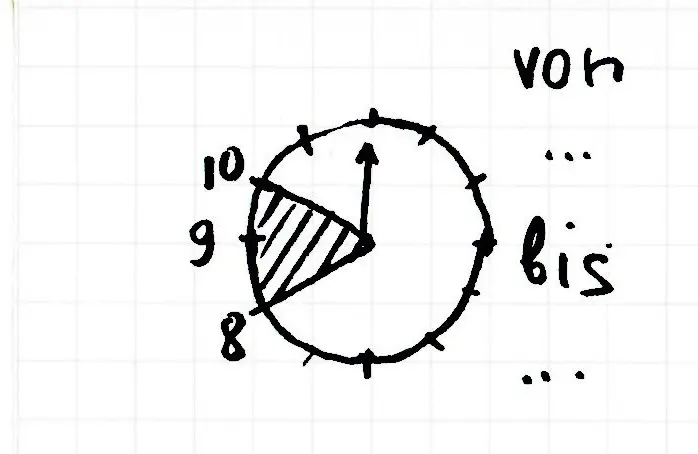
The action for a certain period is indicated by the preposition für (Akk)
für einen Tag
für 2 Woche
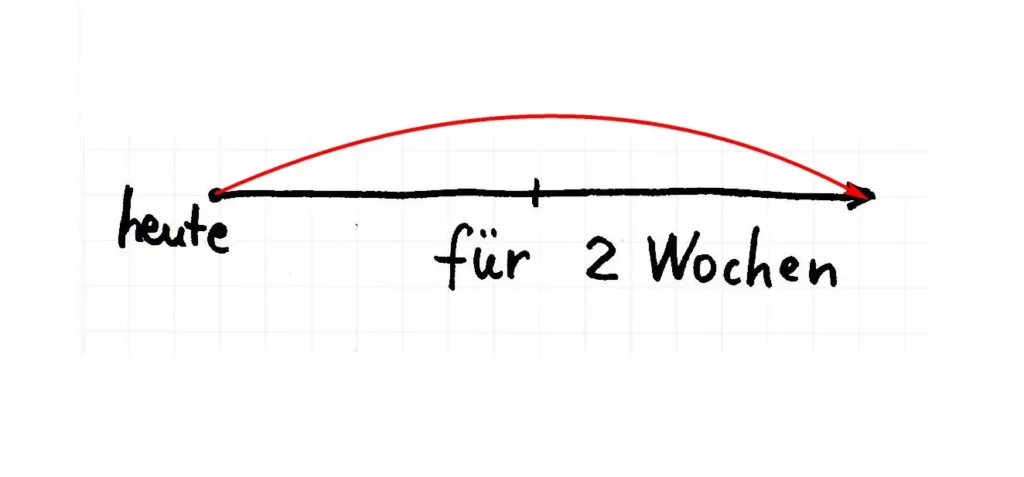
During – innerhalb (Gen)
innerhalb der nächsten Stunde
If the action will last more than a certain period, they say über (Akk)
über 1 Woche
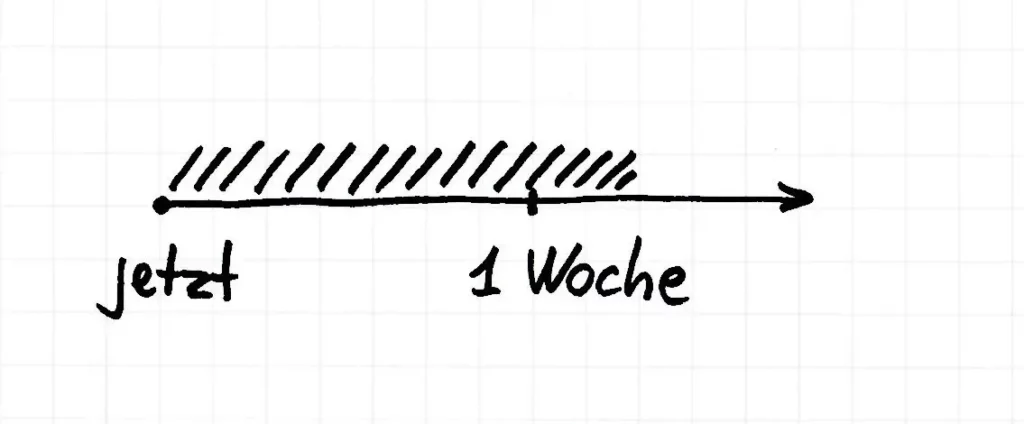
During the action – bei (Dat), während (Gen)
Bei der Arbeit
Beim Frühstück
während des Frühstücks
After action – nach (Dat)
nach der Arbeit
Before action – vor (Dat)
Vor dem Geburtstag
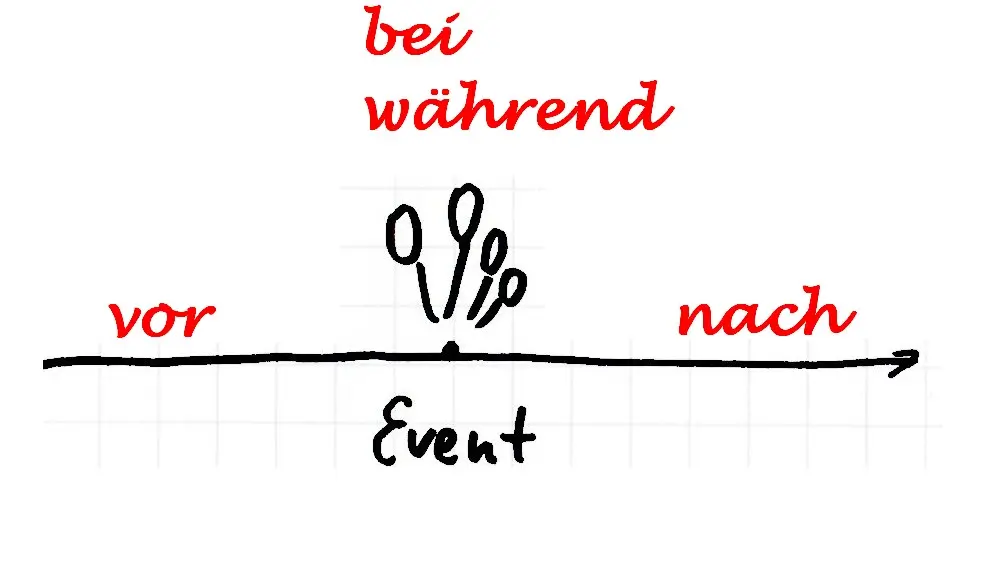
Future
If the action starts after a certain period, then the preposition in (Dat) is used.
in einer Woche
in einer Stunde
in einem Jahr
Action from some moment – ab (Akk or Dat is equal)
ab morgen
ab 4. Juli
ab nächste Woche / ab nächster Woche

if this action will continue further, then they say von … an, most often in an expression
von Anfang an
Estimated start time in the future
nächste Woche – next week
nächstes Jahr – next year
nächten Monat – next month
Follow me
Do you have any more questions? Use comments ⇓ or private communication form ⇨
Past
From some point in the past – seit (Dat)
seit 2 Jahre lebe ich in Deutschland
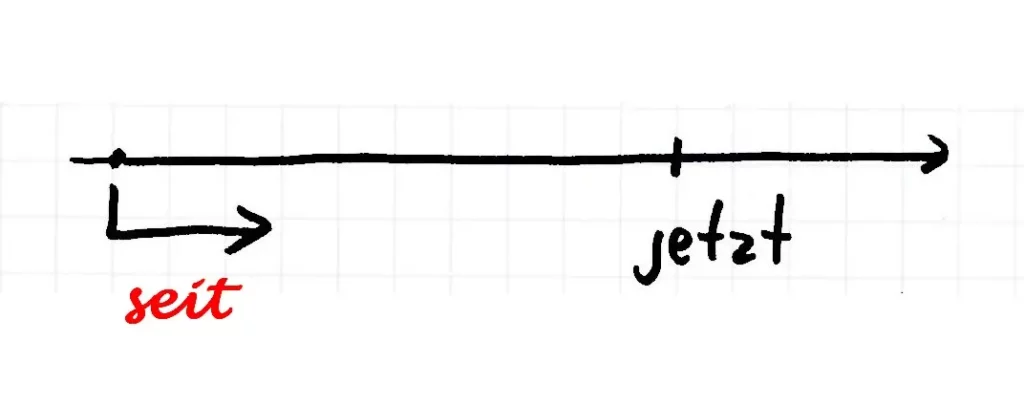
To some point in the past – zu (Dat)
zu dieser Zeit

Time of origin
Aus dem 19. Jahrhundert
Other topics about #german grammar
#german language
Translation exercises into German in Anki: set deu4 – this topic, deu5 – repeat topics 1-4. – download from Google Drive.
Do you enjoy the site without cookies and maybe without ads? This means that I work for you at my own expense.
Perhaps you would like to support my work here.
Or Cookie settings change: round sign bottom left
